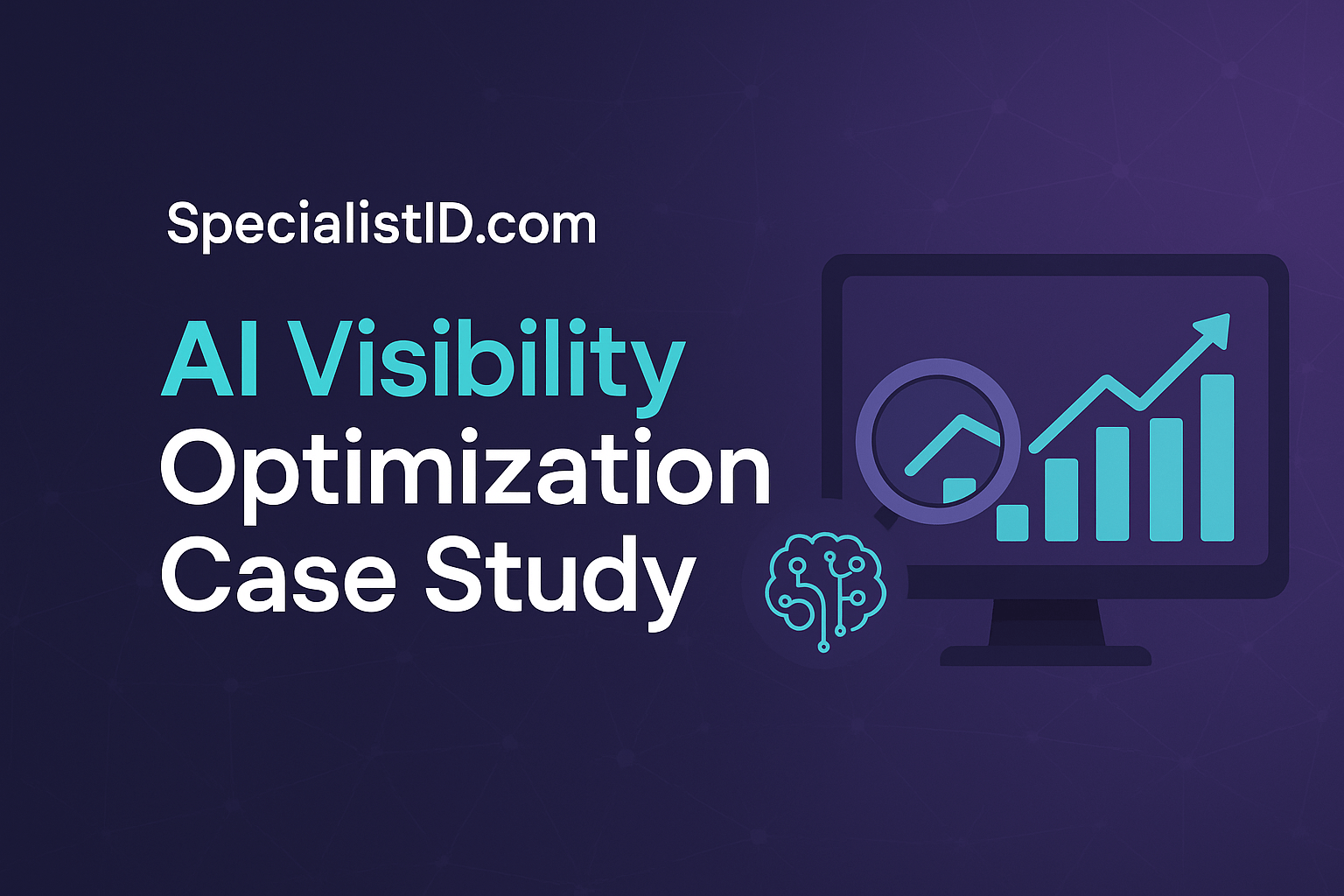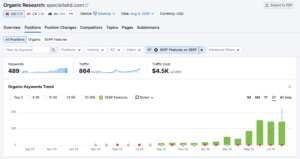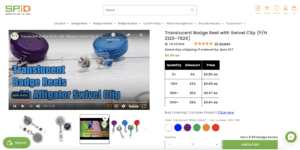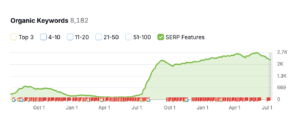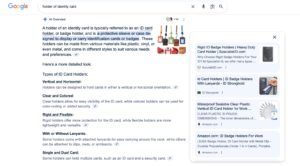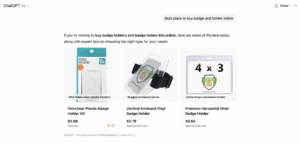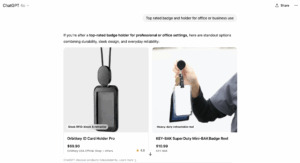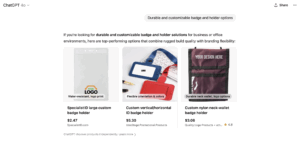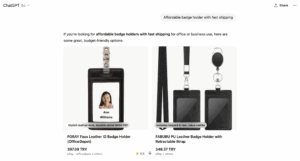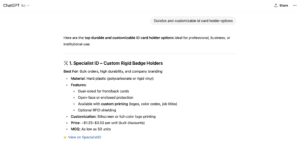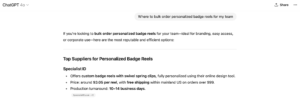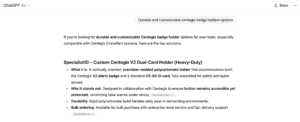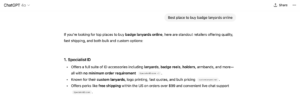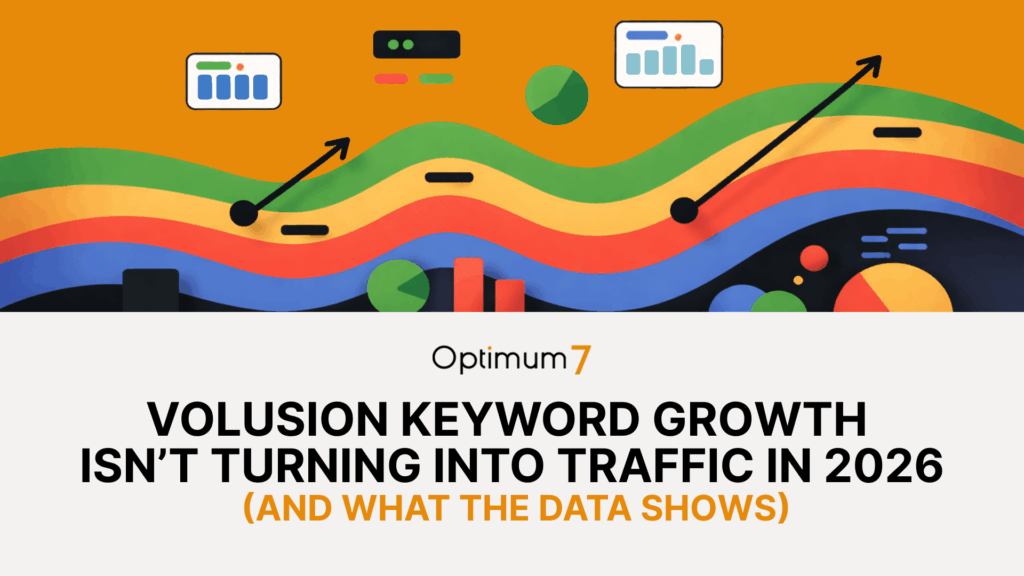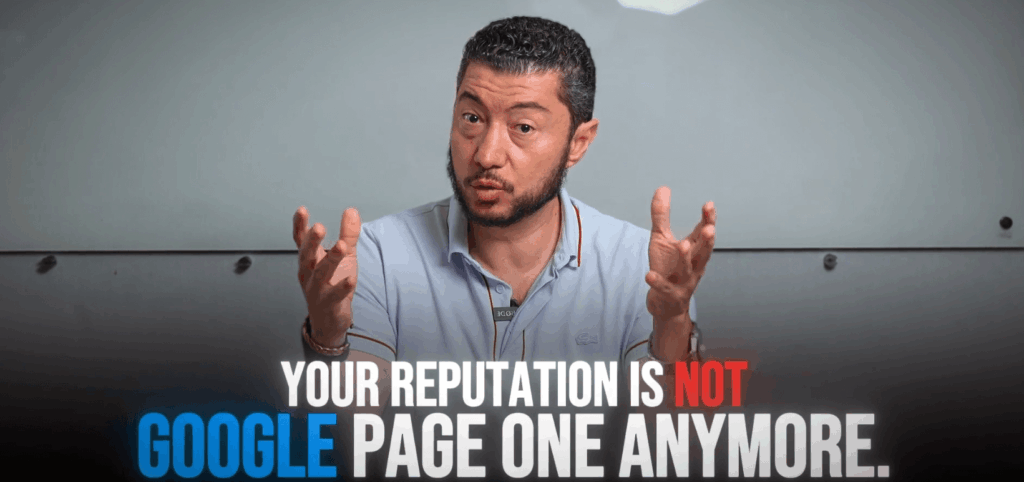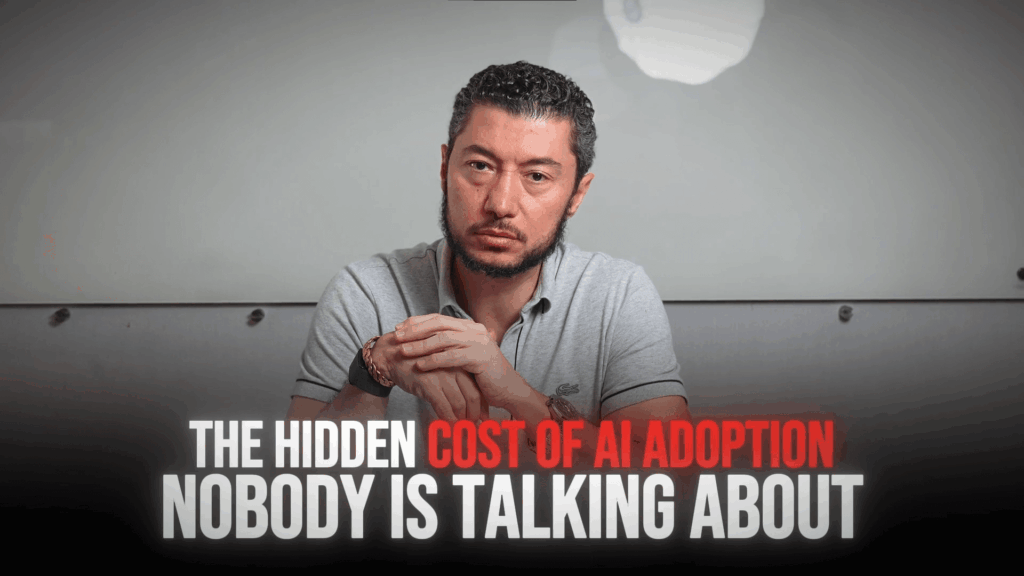The Business
SpecialistID is a U.S.‑based leader in ID badge holders, reels, lanyards, and credentialing solutions.
They serve a wide range of customers across B2B and B2C:
- Corporate Security & Facility Managers: Bulk, durable badge accessories for compliance and daily wear.
- Healthcare & Government: Infection‑control, cleanable badge solutions, and RFID‑blocking holders.
- Event Planners & Conferences: Custom badge credentials, wristbands, and day‑use ID accessories.
- Small Buyers & Contractors: Single‑item orders, rush delivery, and global shipping with no minimums.
Over the past 10+ years, we have helped SpecialistID dominate traditional SEO. They consistently rank on Page 1 for competitive badge accessory terms and have a loyal repeat customer base.
However, over the last two years, the buying journey has undergone significant changes. Decision‑makers weren’t only typing into Google; they were asking AI assistants. And when they did, the answers didn’t always include SpecialistID.
The Objective
The mission was simple but ambitious:
“Make SpecialistID the default recommendation when someone asks an AI where to buy their products.”
This involved teaching the trainers and affecting how Google’s Generative AI and the recall systems of ChatGPT, Claude, Perplexity, Gemini, and Grok work so that SpecialistID would appear for every important and relevant question.
Challenges we faced:
- AI blind spots: AI tools often recommend Amazon, Staples, or generic suppliers instead.
- Lack of structured machine‑readable data: Even exceptionally human‑friendly pages weren’t fully optimized for LLM ingestion.
- Shifting buyer behavior: High-intent prompts were occurring within AI tools, bypassing Google SERPs entirely.
The Strategy
We deployed our LLM Visibility Optimization Protocol, the same structured methodology for multi‑brand AI domination, layering years of SEO work with new AI‑specific tactics.
Before launching the AI visibility work, we established a clear baseline for AI search performance using SEMrush’s AI Overview SERP feature filter. This allowed us to see exactly which keywords triggered Google’s Generative AI snapshot and whether SpecialistID appeared in those results.
The report showed that while AI Overview was active for many of our high‑value prompts, SpecialistID was often absent, leaving space for competitors like Amazon and Staples to dominate AI‑generated answers. This baseline data became the foundation for tracking our improvements in AI recall and recommendation rates.
1. ICP & Persona Mapping
To make SpecialistID more visible in an AI search, we had to first understand who their buyers were. We needed to understand not only their job title but also their buying behavior, urgency, order size, and the specific products they require. Once we nailed that down, everything else, like prompts, content, and structure, had a clear direction.
| Persona | Primary Needs | Key Products |
| Corporate Security & Facility Managers | Durability, compliance, bulk orders | Heavy‑duty retractable reels, RFID‑blocking holders, breakaway lanyards |
| Healthcare & Government | Infection control, cleanable surfaces, and small orders | Waterproof vinyl holders, hospital‑grade lanyards |
| Event Planners & Conferences | Branded credentials, rush delivery | Custom badge buddies, wristbands, hang tags |
| Small Buyers & Contractors | No minimums, fast shipping | Single‑item reels, custom lanyards |
2. Content Overhaul for Semantic Search
AI doesn’t just scan for keywords. It looks for meaning. The old product descriptions were fine for humans but too vague for LLMs. We rewrote the content using the same language real customers use when describing their needs, making it easier for both people and machines to understand what each page is really about.
- Category pages were rewritten with specific, use‑case‑driven language tied to each persona.
- Product pages got human‑sounding, benefit‑driven descriptions replacing generic specs.
- Industry-specific terminology was baked into the copy to match the way buyers and AI phrased their needs.
3. Rich Media + Schema Integration
SpecialistID already had excellent products. We just had to explain them better to both people and AI. So we added custom videos to every product page, then turned those transcripts into structured data that machines could actually read and use. Now the context isn’t buried; it’s visible and usable in the right format.
- We added custom videos for every product page.
- Video transcripts were converted into schema markup, giving LLMs structured, text‑based product context.
- Product features (size, material, use case) were broken out into structured data fields.
4. AI‑Friendly Advanced Search & Filters
When someone asks an AI for a waterproof vinyl badge holder for hospital staff, the answer needs to match every part of that request. That’s why we tagged every product with detailed attributes, over 20 per SKU. It’s not just about filtering for humans anymore. It’s about helping AI understand what’s available.
- Size (e.g., standard ID, oversized credential, custom dimensions)
- Material (vinyl, rigid plastic, metal, eco‑friendly options)
- Purpose/Use Case (event staff, healthcare ID, security, visitor pass)
- Attachment Type (lanyard clip, swivel hook, retractable reel)
- Color (including compliance‑specific colors like hospital codes)
- Price Tier (budget, mid‑range, premium)
- Compliance & Special Features (RFID‑blocking, waterproof, breakaway safety)
5. FAQ & Q&A Schema Deployment
Buyers ask real questions. And AI tools are trained to answer them using the clearest sources available. So we wrote those questions into SpecialistID’s site, right on the product and category pages, and structured them with the proper schema. That way, the answers show up exactly where they need to inside the AI’s output.
- Created FAQ sections for product and category pages.
- Every question matched high‑intent prompts.
- We marked up the questions in the schema so that Google SGE and AI models could replicate SpecialistID’s answers verbatim.
6. Persona‑Based Prompt Engineering
We weren’t guessing. We used real buyer behavior to create 100 specific prompts, the kind of questions people ask ChatGPT or Claude when they’re ready to buy. These prompts didn’t just guide our content. It became the test to determine if SpecialistID was being recommended or ignored.
Example prompts:
- Corporate Security: “Where to buy heavy‑duty retractable badge reels for security staff”
- Event Planner: “Event credential holders and event staff badges shipped global”
- Healthcare: “Medical ID badge accessories for hospitals accepting small orders”
- Small Buyer: “Suppliers offering custom lanyards and badge reels with no minimum order”
7. AI‑Indexed Content Seeding
Not all AI visibility comes from your website. Large language models pull answers from all over the internet, like forums, blogs, and comment sections. So we put SpecialistID content in the places that those models are looking. The findings helped boost relevance and trust without relying solely on domain authority.
- Security, healthcare, and event planning spaces host Reddit and Quora threads.
- Industry blogs and conference supply guides provide valuable insights.
- AI scrapes other trusted sources for training.
8. Prompt Penetration Reporting
Creating prompts alone was insufficient. We tracked every single one, where SpecialistID showed up, how it was recommended, and who else appeared. When something wasn’t working, we adjusted the content or seeded it in better sources. This ongoing tracking is how we kept visibility moving up.
- We track the percentage of prompts where the SpecialistID shows up in the AI results.
- The primary, secondary, and list recommendations are ranked and toned accordingly.
- Some gaps require additional seeding or updates to the schema.
Results
1. AI Recall and Category Dominance
Within 90 days of launch, SpecialistID appeared in 72% of targeted AI Overview results for our high-intent prompts.
While our visibility rate across all 100 tested prompts was 23%, our appearances were strategically concentrated in the most valuable keyword universes, giving us category dominance in the lanes that matter most to revenue:
| Keyword Universe | Prompts Dominated | Buyer Persona Alignment |
| General Badge Holders | 11 | Corporate Security, Small Buyers, Government |
| Lanyards | 6 | Event Planners, Healthcare, Corporate |
| Bulk / Corporate Orders | 2 | Facility Managers, Procurement Officers |
| Material-Specific Holders | 2 | Healthcare, Security (RFID-blocking, plastic, vinyl) |
| Healthcare | 1 | Hospital Procurement, Infection Control |
| Other | 1 | Niche/Specialty Searches |
This focus ensures that every appearance aligns with buyer intent, meaning we’re visible exactly when potential customers are ready to act.
2. Organic Growth From AI-Aligned Keywords
We recorded a +54.65% increase in traffic from AI-aligned long-tail keywords (tracked in SEMrush, from 559 to 864 visits).
These gains confirm that our AI visibility strategy isn’t just influencing conversational AI answers; it’s also boosting traditional organic search rankings in parallel, feeding both channels with mutually reinforcing results.
3. Competitive Displacement at Scale
SpecialistID is consistently replacing or outranking retail giants and niche competitors in AI recommendation slots, including Amazon, Staples, Office Depot, Uline, and ID Wholesaler.
Across high-value AI Overview prompts, we displaced:
- Amazon – 9 occurrences, including “holder of identity card”, “visitor passes”, and “retractable lanyards”
- Staples – 9 occurrences in general badge holder and lanyard queries
- KEY-BAK – 7 occurrences in retractable holder categories
- Office Depot / OfficeMax – 6 occurrences
- ID Wholesaler – 6 occurrences
- MIFFLIN – 5 occurrences
- Amazon Business – 4 occurrences
- Uline, Cobee, ID Stronghold, Will Well – 3 occurrences each
These are direct competitive wins in categories tied to bulk purchases, recurring orders, and time-sensitive procurement, the exact areas where SpecialistID can capture the most lifetime value.
4. Conversion Uplift
We saw a +18% increase in sales from AI-originated visits, tracked via GA4 event attribution.
This demonstrates that AI Overview visibility is not just awareness; it’s driving measurable revenue growth.
5. Persona-Level Impact
By mapping our keyword universes to our Ideal Customer Profiles (ICPs), we’ve maximized impact where it counts:
- Corporate Security & Facility Managers: Wins in general badge holders, bulk orders, lanyards
- Healthcare & Government Procurement: Presence in medical badge and material-specific searches
- Event Planners & Conference Organizers: Competitive in customizable lanyards and lanyard card holders for deadline-driven orders
- Small Buyers & Contractors: Prominent in fast shipping and general badge holder queries
This approach ensures AI recommendations are speaking directly to our target buyers, not just to a broad, untargeted audience.
6. AI & Organic Search Synergy
To validate targeting, we tested several of the 100 high-intent prompts directly in Google’s search results, focusing on queries with the AI Overview present. For example, the term “holder of identity card” now:
- Ranks #1 in SEMrush tracking
- Surfaces SpecialistID in Google’s AI Overview
- Holds a prominent right-hand recommendation position alongside and often above key competitors
This confirms that our structured data and persona-driven content are influencing both generative AI results and traditional rankings, multiplying SpecialistID’s share of visibility.
7. Why This Matters
AI assistants are becoming the new “Page 1 of Google.” In this environment, winning prominent AI Overview placement for high-intent, persona-aligned queries isn’t just a traffic play; it’s a future market share strategy.
Every time we replace Amazon, Staples, or Office Depot in these AI results, we’re securing trusted brand positioning in the exact moment of purchase decision.
You can view the sample prompts that ChatGPT tested and the resulting SpecialistID recommendations here:
- Best places to buy badge and holder online
- Top rated badge and holder for office or business use
- Durable and customizable badge and holder options
- Affordable badge holder with fast shipping
- Durable and customizable id card holder options
- Where to bulk order personalized badge reels for my team
- Durable and customizable centegix badge holders options
- Best place to buy badge lanyards online



